- Home
- Janet Dailey
Texas Fierce Page 3
Texas Fierce Read online
Page 3
“Thanks for the warning.” Bull took the keys. “I’ll try not to be gone too long. And I’ll help you bury that calf when I get back.”
* * *
Jasper watched the pickup disappear down the bumpy road. Maybe he should’ve gone along on the ride back to town. Williston’s boy had grown up big and strong. But young Bull had a lot to learn. He was bound to make mistakes. Maybe that was the only way to get smart.
Keeping a sharp eye out, Jasper walked around the barn and past the sheds to a patch of cleared ground on a low rise of land. There, bordered by rocks and marked by crude wooden slabs, were two graves. The older, smaller one was covered with the dry remnants of spring wildflowers, now gone to seed. The newer grave was a narrow mound of raw earth, the dust lightly blowing off the top. Jasper stood at the foot of that grave and spoke out loud.
“Well, Williston, I kept my promise. I found your boy and brought him home. You’d be proud of how he’s turned out. One day he’ll be a man who can hold his head up anywhere. But Lord Almighty, thinkin’ about the hard times he’ll be facin’ gives me the cold shivers.”
As if in answer, a breath of wind blew over the grave, stirring dust into Jasper’s eyes. Jasper blinked away a tear. Williston Tyler had been the saddest man he’d ever known, and one of the toughest. Even toward the end of his life, when he’d been in so much pain he could barely stand to mount a horse, Williston had insisted on working cattle with the hired hands.
“I know you was hard on the boy,” Jasper continued. “And I know he hated you for it. Maybe one day he’ll understand why you did what you did, and how much you really loved him. But since I promised not to tell him the truth right off, I reckon he’ll just have to figure it out for his self.”
Thrusting his hands into his pockets, Jasper turned and walked back toward the barn. He’d never promised Williston he’d stay on, he reminded himself. He had plenty of reason to leave, including a pretty girl back in the hill country, just waiting for him to come home, marry her, and settle down on her dad’s farm. But he couldn’t leave yet—not with the ranch teetering on the brink of ruin and Williston’s boy so inexperienced and unaware of the dangers. Walking away now would be like leaving a half-grown pup in the path of a cattle stampede.
He would stay—not for long, but for now.
Lengthening his stride, Jasper entered the house by the back door, passed through the cluttered kitchen and down the hall. He’d moved his few possessions from the dilapidated bunkhouse into one of the spare bedrooms to keep an eye on Williston. After the old man was gone, it hadn’t made sense to move out.
The Colt .45 Peacemaker hung from its belt on a nail in the back of the closet. He took the heavy pistol down, strapped it around his hips, and went back outside to look for Carlos.
* * *
The sheriff’s office, along with the jail, the courtroom, and the library, was still housed in the old county building on Main Street. Bull parked the truck and crossed the lawn to the front door. So far nothing seemed to have changed. Same dingy beige walls, needing paint. Same creaky floorboard outside the sheriff’s office. The receptionist at the desk, though a little older and grayer, was the woman he remembered from the library, which she opened on Tuesday and Thursday afternoons. Same wire-rimmed glasses, same mole on her chin. Even her flowered dress looked familiar. Mildred, that was her name. Mildred Patterson.
He cleared his throat, causing her to look up from the romance novel she was reading. The puzzled expression on her face dissolved as she recognized him. But she looked more startled than pleased.
“Hello, Mrs. Patterson.” Bull remembered to take off his hat.
“Virgil Tyler! Heavens to Betsy, you’ve grown up!” Her voice seemed unnaturally shrill. “When did you get back into town?”
“Today. We’ve got trouble at the ranch. I need to talk to the sheriff.”
She glanced toward the sheriff’s closed door, then seemed to check the spiral notebook on her desk. “I’m sorry, but he’s out. Would you like to leave a message?”
Virgil hesitated. He could ask the woman to pass on a report about Carlos and his car. But then he’d miss his chance to question the sheriff about his father’s death.
“If it’s all the same to you, I’d like to talk to Sheriff Mossberg. When’s he due back?”
“He didn’t say. You could try after lunch. Again, I’d be happy to pass on a message.”
Bull’s eyes caught a flicker of movement behind the frosted glass pane on the sheriff’s door. Was someone in the office, or was it just a trick of the light—maybe a tree limb blowing outside the office window?
“Thanks, but I’ll come back later,” he said. “Tell the sheriff I stopped by.”
Tugged by a vague uneasiness, Bull walked back to the truck. Nothing was wrong, he told himself. Mildred Patterson had been cordial enough, and it made sense that the sheriff might be busy doing his job. But Jasper had said that things had changed in town. Was this what he’d meant?
He drove to the feed store, where hay was sold by the bale from a shed out back. It was expensive here. Buying a big load from a farmer would have been a better bargain. But this was an emergency, and he’d only be taking enough hay to fill the back of the pickup.
He parked around back where he could load and went inside to order and pay. The pugnacious-looking red-headed man behind the counter was a stranger. He glanced out the back window at the rusty pickup.
“If you’re wantin’ hay for the Tyler place, I can’t sell you no more,” he said. “Your credit’s all used up, and your account’s past due.”
“I can pay cash,” Bull said.
“You got enough cash to pay off the account? There’s more than eight hundred dollars owed on it.”
Bull tried to ignore the knot in his stomach. “I can’t pay it off now, but I can pay cash for a pickup load.”
The man folded his arms across his burly chest. “No deal. Clear off the debt and we can do business. Otherwise, good luck findin’ hay anyplace else.”
Bull fought the urge to punch the man’s smug, freckled face. Hay was scarce right now with last fall’s crop almost gone and the spring crop still in the field. He’d be lucky to find any for sale, and the bastard knew it.
He pictured the starving horses and cattle. His hand went to his wallet. “Can you take a credit card?”
“If it’s any good. And if you can show me some ID.”
Bull had used the Visa card to tide him over between rodeos. Clearing the account and paying for the new hay would damn near max out his limit. But he didn’t have much choice. He watched as the clerk checked his driver’s license, ran the card, and handed him the slip to sign.
“Virgil Tyler.” The man checked the card against the signature. “I heard that old drunk had a boy who’d lit out for the rodeo. That you?”
Bull held his temper with effort. “Williston Tyler was my father. But I don’t go by Virgil anymore. The name is Bull Tyler.”
“Bull Tyler, huh?” The man grinned. “Well, good luck livin’ up to that one.”
Bull took the receipt, walked outside, and gave it to the yard man, also a stranger, who loaded the bed of the truck with bales of hay. Bull climbed into the cab and drove off. Jasper was right. Things had changed in Blanco Springs. And not in a good way.
But he had changed, too. At just short of twenty-one, he was a man—the last of his family. His father had left him a legacy of tragedy and ruin—along with a choice. He could sell the ranch and leave for good, with enough money to make a new start anywhere he chose. Or he could stay, pay off his father’s debts, rebuild the ranch, and create a legacy of his own—a new dynasty of Tylers who could look any man in the eye and face any challenge together.
But what was he thinking? Hell, even with his savings in the bank, he didn’t have enough money to run the ranch for more than a couple of months, let alone make the repairs and buy new stock. He’d have to be crazy to bust his gut and empty his bank account when he could j
ust sell out and leave.
He drove past the county building. The sheriff’s big tan Jeep, which he’d noticed earlier, was gone from its parking spot. He would have to check back later. Meanwhile, he had time to kill, and he was getting hungry. He didn’t plan to buy groceries until he was ready to leave town. Otherwise the food might spoil in the hot truck. It wouldn’t hurt to grab a two-dollar burger and a Coke while he waited for the sheriff.
By now it was lunchtime. There were half a dozen vehicles in the Burger Shack parking lot. One of them was a sleek, red Thunderbird convertible, with its top down. As he drove past it, Bull couldn’t resist slowing down to admire its flashy beauty. Never in his life would he own such a machine—or even want to. But it was no sin to look. Jasper had mentioned that Ferguson Prescott was driving a car like that. No surprise there. Ferg had always been a show-off.
Bull parked the truck, tossed his hat on the seat, and pocketed the keys. Sooner or later he was bound to run into Ferg. Here was as good a place as any.
After pushing open the restaurant door, he looked around. He could see Bonnie, busy behind the counter, but Ferg was nowhere in sight. Only as Bull walked up to place his order did he spot his onetime friend in the round corner booth.
Ferg had been a linebacker on the high school football team. He was no more than average height but was built like a brick wall, all muscle. Like Bull, he’d put on a good thirty pounds in weight since then. With his wavy chestnut hair carefully combed, his square-chiseled face clean-shaven, he could’ve passed for the star of a TV Western.
And he wasn’t alone.
Sitting across from him in the booth was a girl. More child than woman, she couldn’t have been much older than sixteen. Her blond hair was pulled back from her face in a messy ponytail. The fabric of her olive green tee showed the firm buds of her breasts. Her bell-bottom jeans were stylishly frayed. All in all, she was just a gangly kid. But she had beautiful eyes—deep dove gray, strangely haunting. And her full lips formed a pretty, childish pout. Given a couple of years to grow up, she could be worth a second look.
But what the hell was a kid like that doing with Ferg?
“Hey, Virgil!” Ferg gave him a wave. He’d always been a friendly sort, but Bull knew better than to turn his back on him. Jasper’s opinion of the Prescotts was spot-on.
He shifted over, making space in the booth. “Bonnie told me you were back in town. Come have a seat and tell us what you’ve been up to.”
Bull would have ignored the invitation, but something about the girl intrigued him—maybe even worried him. And it wouldn’t hurt to know what was going on with Ferg and his family. He placed his order with Bonnie, who gave him a smile and a wink. Then, taking his Coke, he ambled over to the booth and sat down.
Leaning back against the corner part of the seat, Ferg appeared to be taking his measure. “Sorry about your dad,” he said.
“Thanks.” Bull held his tongue in check. He wasn’t here to bait Ferg. He was here to listen and learn.
A slow grin stole across Ferg’s face. “Bonnie tells me you’re going by another name. Bull, is it?”
“That’s right.”
“Short for Bullshit?”
The jab hit home, and the bastard knew it. Ferg’s grin broadened.
“No.” Bull steeled his resolve to stay cool. “It’s a nickname the other bull riders gave me because I could take a pounding without giving up. You might say I earned it.”
“Is that right? I’d have guessed they called you Bull because you smelled like one.” Ferg kept his grin. The girl sipped her Coke, her gray eyes shifting from one man to the other as if she might be hoping to see a fight. She had long, restless hands, the fingernails bitten to the quick.
Bull took a long draw on his Coke. “Question for you, Ferg,” he said. “How much do you get paid for babysitting?”
Ferg looked startled. Then he laughed. “Bull Tyler, allow me to introduce my cousin, Miss Susan Rutledge. Her dad and my dad were stepbrothers growing up. I guess, technically, that makes us stepcousins. Her dad is here visiting from Savannah, so I volunteered to show her the town.”
“My apologies, Miss Susan Rutledge.” Bull gave her a nod, savoring the classy sound of her name when he pronounced it.
The girl glared back at him. “Ferg told me the people around here were ill-mannered bumpkins,” she said. “Now I know what he meant. For your information, Mister Bull Tyler, I’m not a baby. I even smoke.”
“Not legally.” Ferg gave her a playful nudge. Her giggle was like a little girl’s. Watching them, Bull felt a low-simmering anger. If Ferg was messing around with this underage child, he deserved to be shot.
“Do you chew, Miss Susan?” Bull’s question dripped sarcasm. “I’ve got a plug of tobacco in my pocket. I’d be happy to share it with you.”
The girl pulled a face. “Ugh! That’s gross. Last summer I kissed a boy who chewed. It tasted awful.”
“Suit yourself. No skin off my nose.” Bull sipped his Coke. What the girl did was none of his business. But somebody ought to warn her that she was in bad company.
“So, Bull, are you home to stay?” Ferg asked.
Bull shrugged. “I just got here. Ask me in a week or two.” No use talking about the dire condition of the ranch. He wouldn’t be telling Ferg anything he didn’t already know. “How are your parents?” he asked, making polite conversation.
“My mother passed on two years ago. My dad’s as ornery and stubborn as ever.”
“I didn’t know about your mother,” Bull said. “I’m sorry.”
“Dad’s already grooming me to take over the ranch. He keeps pushing me to get hitched and give him a passel of grandsons to carry on the family name. Hell, I’m too young for that! I’ve got a lot of living to do before I settle down.”
“Smart thinking,” Bull said. “I can’t picture you as a father. Not yet at least.”
Had Ferg just flinched? Dismissing the thought, Bull glanced around to see Bonnie coming from behind the counter with his burger on a paper plate.
“Here you are, cowboy.” She set Bull’s order on the table, bending close to give him a view of her ample cleavage. “The fries are extra special from me. Eat hearty.”
Bull hadn’t ordered fries. “Thanks,” he said as she strutted away, hips twitching with every step.
Bull reached for the ketchup and was pouring it on the fries when he realized he was the only one with food. “Aren’t you two eating?” he asked.
“Naw. We’ve got lunch waiting at home. We were just having Cokes. Come on, Cousin Susan, I need to get you back to the ranch before your dad sends a posse after us. Enjoy your burger, Bull.”
Ferg slid around the booth, pushing the girl out ahead of him. When she stood, Bull saw that she was surprisingly tall and as slim as a boy. Ferg’s hand rested on the small of her narrow back as he ushered her toward the door. Neither of them looked back at Bull to say good-bye.
From behind the counter, Bonnie watched them go. Her mouth was fixed in a smile, but even from where he sat, Bull could see the troubled look in her brown eyes.
Bull finished his burger and fries. By the time he left, she was busy with other customers.
* * *
Returning to the county building, Bull spotted the sheriff’s Jeep in its usual place. He parked the truck and went back inside. In the outer office, Mildred Patterson glanced up from her romance novel. “The sheriff is expecting you, Virgil,” she said. “Go on in.”
Sheriff Vern Mossberg rose from behind his massive oaken desk. He looked to be nearing fifty, square jaw, square shoulders and chest, ramrod spine, close-clipped hair, and an immaculately pressed uniform. Retired military, Bull guessed. Army, or marines. He had that look about him.
“Mr. Tyler.” He acknowledged Bull with a curt nod. “Please have a seat.”
Bull lowered himself onto a straight-backed metal chair that faced the desk. Mossberg took his seat, fixing him with a steely gaze. “Now, what can I do for you?”
he demanded.
“Two things,” Bull said. “First, I want to report a missing man and the theft of his car.”
“The man’s name?” Mossberg picked up a pen and slid a yellow pad to the front of the desk.
“His name is Carlos Ortega. He’s our ranch cook, and he was gone when we—”
“Ortega, you say?” the sheriff interrupted. “He’s Mexican?”
“Yes. He’s worked for us about ten years. He—”
“Is he here legally? Does he have citizenship, or maybe a green card?”
“I never thought to ask.” Bull’s frustration seethed. “Look, the man’s missing, along with his car. I found the crucifix he always wore. It was broken, like it had been ripped off him. All I’m asking is that you put an alert out for his car—it’s a restored Buick, easy to spot. I can give you the plate number.”
Mossberg shook his head. “Mr. Tyler, my policy is not to waste time chasing after illegal Mexicans or their vehicles. If you have proof that he’s legal, bring it in. Otherwise, if you want to track him down, I suggest you contact the border patrol.”
“Listen, Sheriff,” Bull argued. “Carlos isn’t a criminal. He’s a harmless old man. He could be hurt somewhere, or dead.”
The sheriff gave Bull a stony look. “I told you, it’s not my job to track down illegals. Now, what was the second thing you wanted?”
Bull checked the urge to get up and leave. He already sensed that this errand was a waste of time. But whatever the sheriff had to say, even if it wasn’t helpful, he needed to hear it.
He cleared his throat. “It’s about my father. After he went missing, he was found at the bottom of a cliff. His death was ruled an accident. Why wasn’t it investigated as a possible murder? How do you know he wasn’t pushed, or killed before he fell?”
The sheriff scowled. “It wasn’t a difficult call. There were no signs of a struggle, no injuries that wouldn’t have been caused by the fall. He wasn’t shot or stabbed or drugged—although there was plenty of alcohol in his system. As far as I’m concerned, the case is closed.”

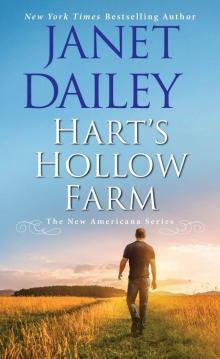 Hart's Hollow Farm
Hart's Hollow Farm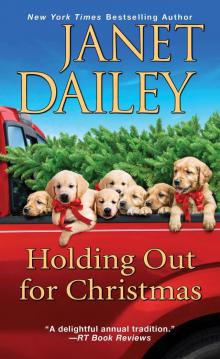 Holding Out for Christmas
Holding Out for Christmas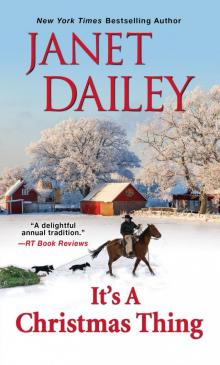 It's a Christmas Thing
It's a Christmas Thing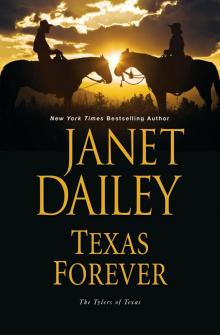 Texas Forever
Texas Forever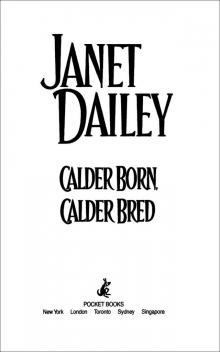 Calder Born, Calder Bred
Calder Born, Calder Bred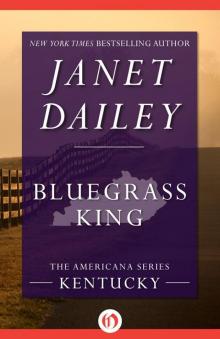 Bluegrass King (The Americana Series Book 17)
Bluegrass King (The Americana Series Book 17)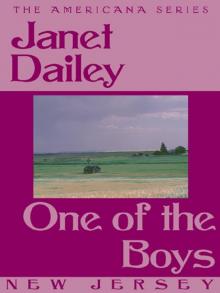 One of the Boys
One of the Boys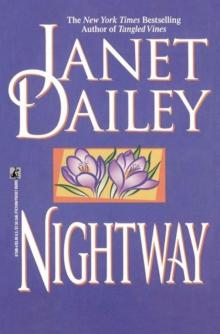 Nightway
Nightway This Calder Sky
This Calder Sky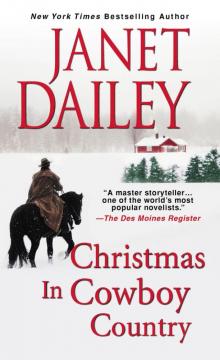 Christmas in Cowboy Country
Christmas in Cowboy Country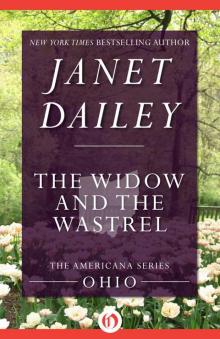 The Widow and the Wastrel
The Widow and the Wastrel Separate Cabins
Separate Cabins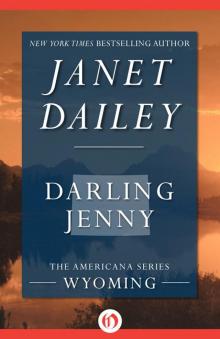 Darling Jenny
Darling Jenny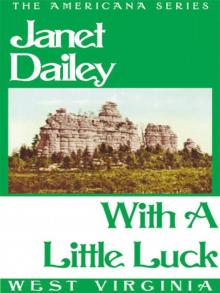 With a Little Luck
With a Little Luck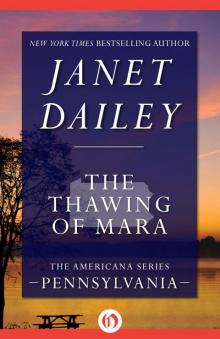 The Thawing of Mara
The Thawing of Mara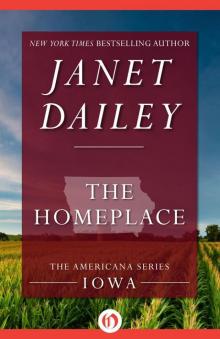 The Homeplace (The Americana Series Book 15)
The Homeplace (The Americana Series Book 15)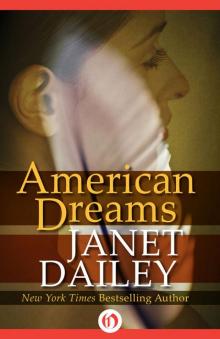 American Dreams
American Dreams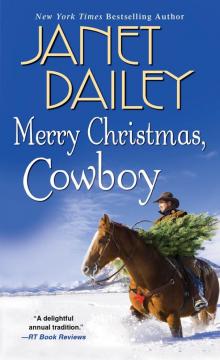 Merry Christmas, Cowboy
Merry Christmas, Cowboy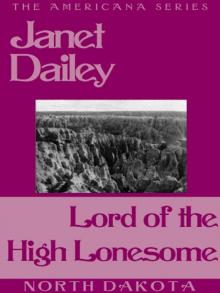 Lord of the High Lonesome
Lord of the High Lonesome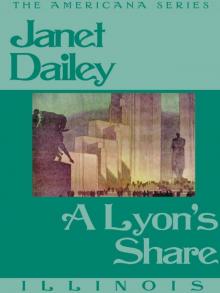 A Lyon's Share
A Lyon's Share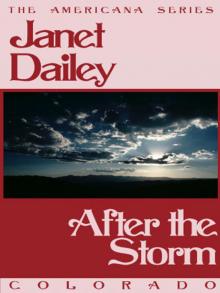 After the Storm
After the Storm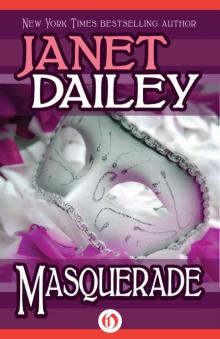 Masquerade
Masquerade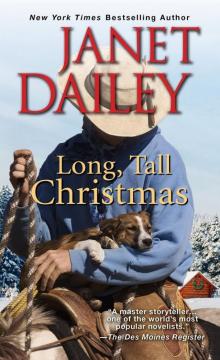 Long, Tall Christmas
Long, Tall Christmas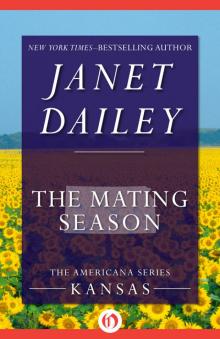 The Mating Season
The Mating Season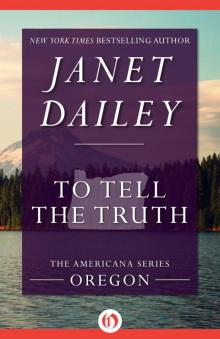 To Tell the Truth
To Tell the Truth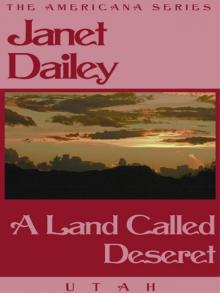 A Land Called Deseret
A Land Called Deseret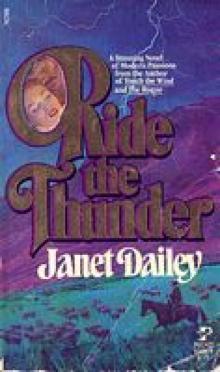 Ride the Thunder
Ride the Thunder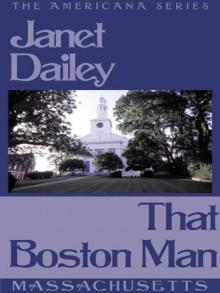 That Boston Man
That Boston Man Wild and Wonderful
Wild and Wonderful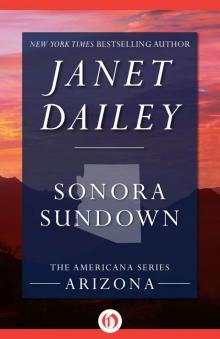 Sonora Sundown: Arizona (The Americana Series Book 3)
Sonora Sundown: Arizona (The Americana Series Book 3)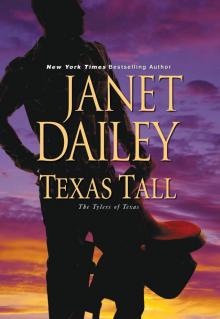 Texas Tall
Texas Tall Giant of Mesabi
Giant of Mesabi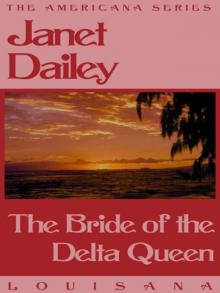 The Bride of the Delta Queen
The Bride of the Delta Queen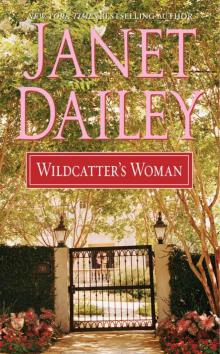 Wildcatter's Woman
Wildcatter's Woman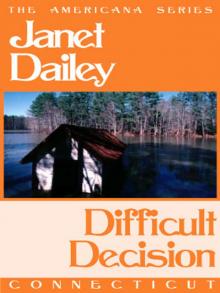 Difficult Decision
Difficult Decision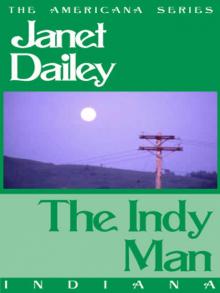 The Indy Man
The Indy Man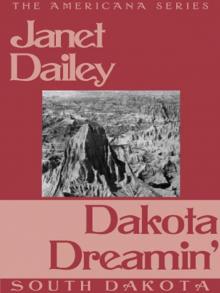 Dakota Dreamin'
Dakota Dreamin' Kona Winds
Kona Winds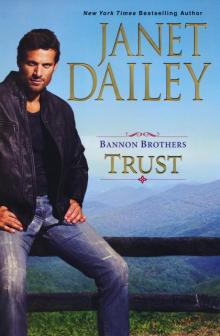 Bannon Brothers
Bannon Brothers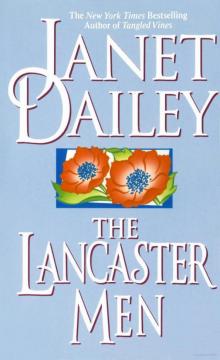 The Lancaster Men
The Lancaster Men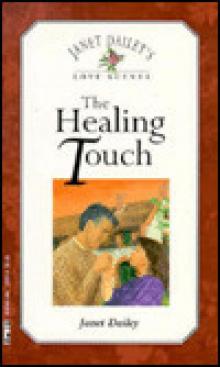 janet dailey- the healing touch
janet dailey- the healing touch Strange Bedfellow
Strange Bedfellow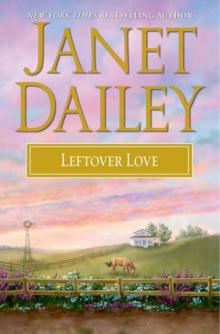 Leftover Love
Leftover Love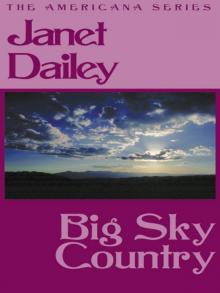 Big Sky Country
Big Sky Country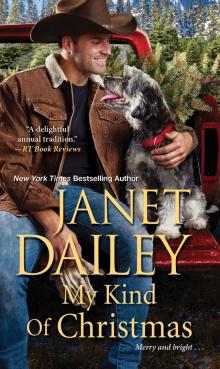 My Kind of Christmas
My Kind of Christmas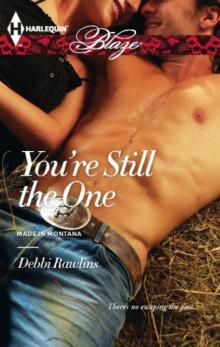 You're Still The One
You're Still The One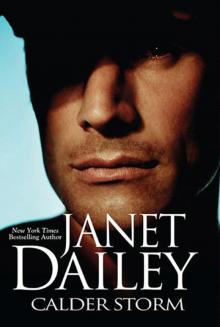 Calder Storm
Calder Storm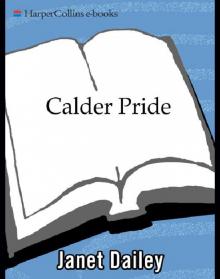 Calder Pride
Calder Pride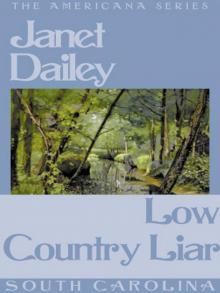 Low Country Liar
Low Country Liar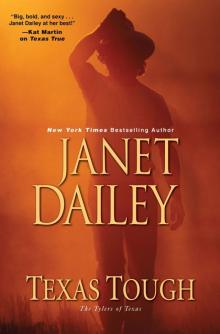 Texas Tough
Texas Tough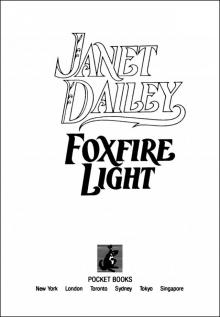 Foxfire Light
Foxfire Light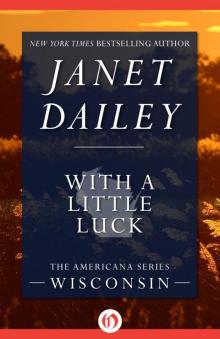 With a Little Luck (The Americana Series Book 49)
With a Little Luck (The Americana Series Book 49)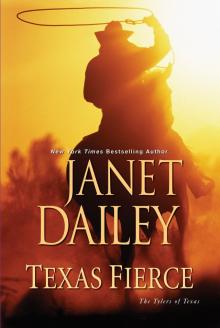 Texas Fierce
Texas Fierce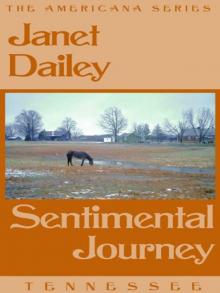 Sentimental Journey
Sentimental Journey The Pride of Hannah Wade
The Pride of Hannah Wade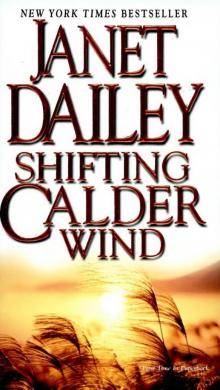 Shifting Calder Wind
Shifting Calder Wind Santa In Montana
Santa In Montana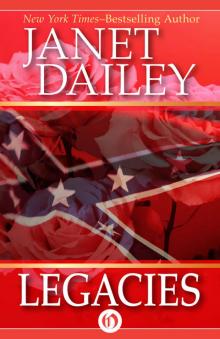 Legacies
Legacies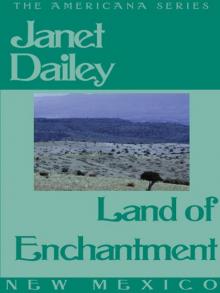 Land of Enchantment
Land of Enchantment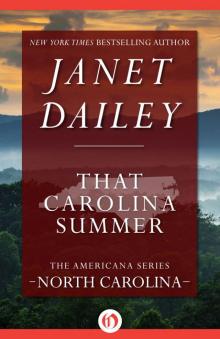 That Carolina Summer (North Carolina)
That Carolina Summer (North Carolina) Reilly's Woman
Reilly's Woman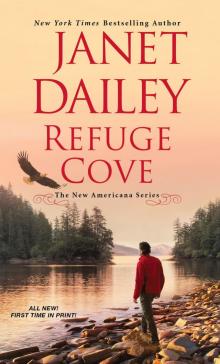 Refuge Cove
Refuge Cove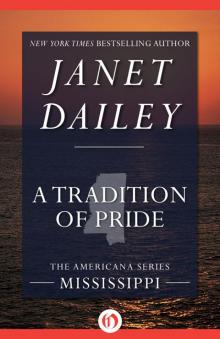 A Tradition of Pride
A Tradition of Pride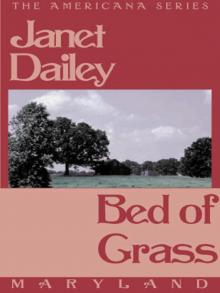 Bed of Grass
Bed of Grass To Santa With Love
To Santa With Love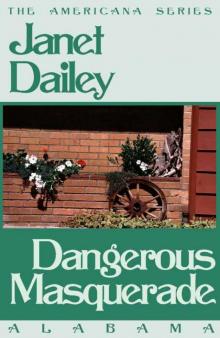 Dangerous Masquerade
Dangerous Masquerade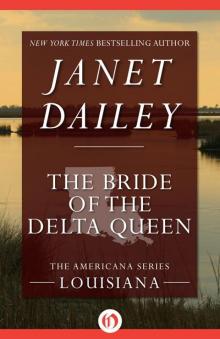 The Bride of the Delta Queen (The Americana Series Book 18)
The Bride of the Delta Queen (The Americana Series Book 18)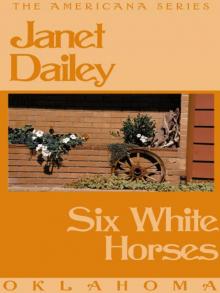 Six White Horses
Six White Horses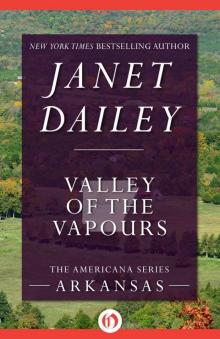 Valley of the Vapours (The Americana Series Book 4)
Valley of the Vapours (The Americana Series Book 4)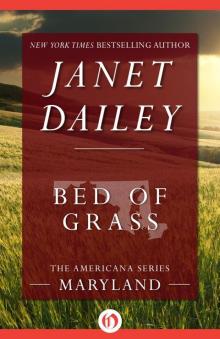 Bed of Grass (The Americana Series Book 20)
Bed of Grass (The Americana Series Book 20)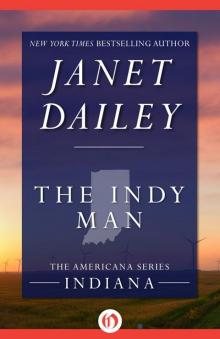 The Indy Man (The Americana Series Book 14)
The Indy Man (The Americana Series Book 14)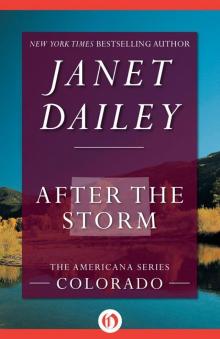 After the Storm (The Americana Series Book 6)
After the Storm (The Americana Series Book 6)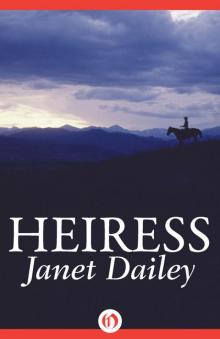 Heiress
Heiress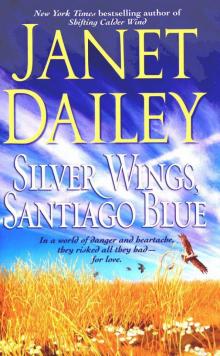 Silver Wings, Santiago Blue
Silver Wings, Santiago Blue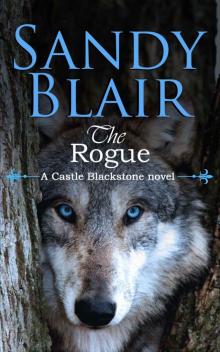 The Rogue
The Rogue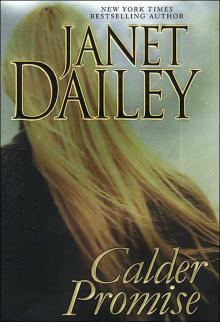 Calder Promise
Calder Promise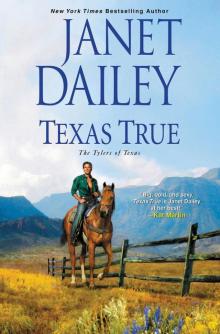 Texas True
Texas True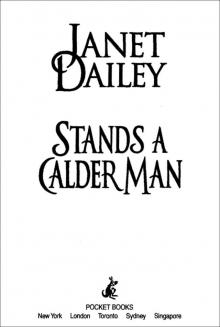 Stands a Calder Man
Stands a Calder Man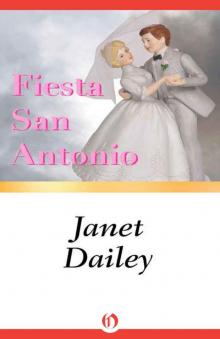 Fiesta San Antonio
Fiesta San Antonio Fire and Ice
Fire and Ice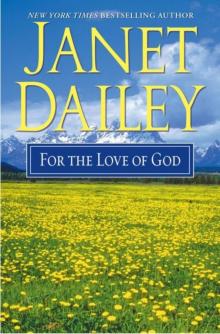 For the Love of God
For the Love of God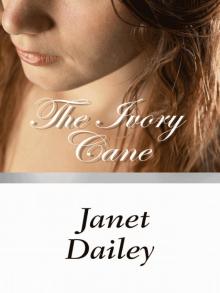 The Ivory Cane
The Ivory Cane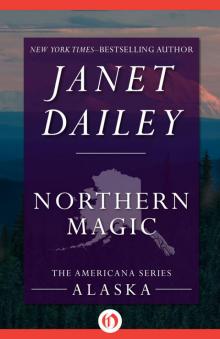 Northern Magic
Northern Magic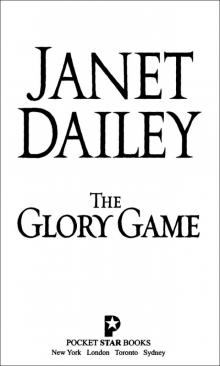 The Glory Game
The Glory Game The Homeplace
The Homeplace The Great Alone
The Great Alone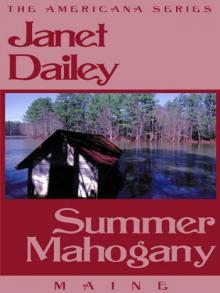 Summer Mahogany
Summer Mahogany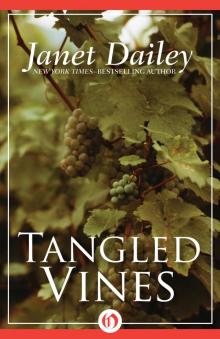 Tangled Vines
Tangled Vines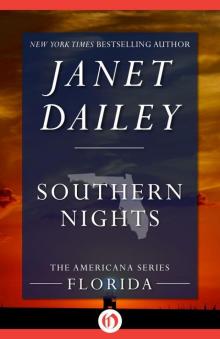 Southern Nights: Florida (The Americana Series Book 9)
Southern Nights: Florida (The Americana Series Book 9)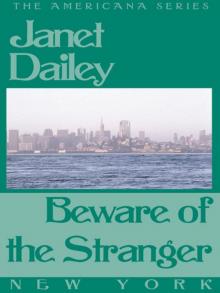 Beware of the Stranger
Beware of the Stranger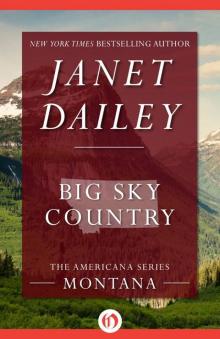 Big Sky Country: Montana (The Americana Series Book 26)
Big Sky Country: Montana (The Americana Series Book 26)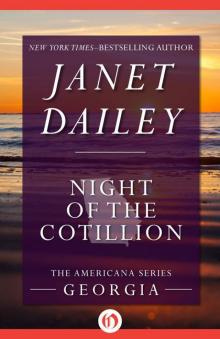 Night of the Cotillion: Georgia (The Americana Series Book 10)
Night of the Cotillion: Georgia (The Americana Series Book 10)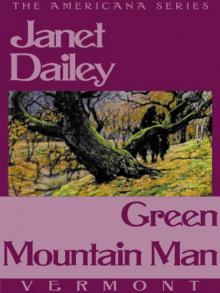 Green Mountain Man
Green Mountain Man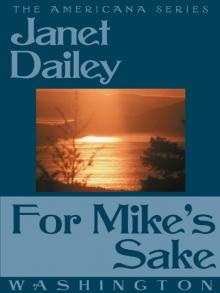 For Mike's Sake
For Mike's Sake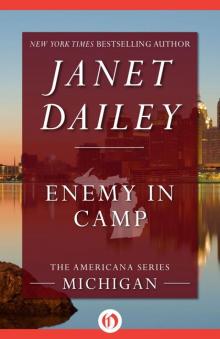 Enemy in Camp (The Americana Series Book 22)
Enemy in Camp (The Americana Series Book 22)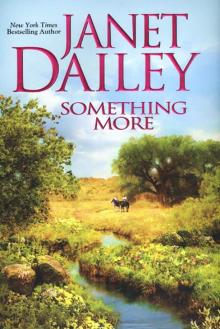 Something More
Something More Rivals
Rivals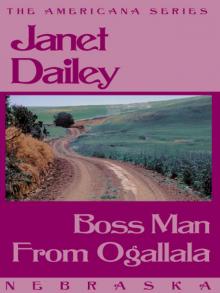 Boss Man from Ogallala
Boss Man from Ogallala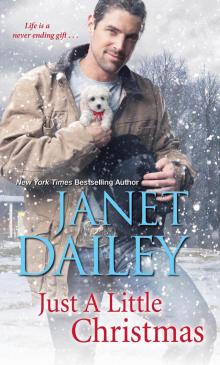 Just a Little Christmas
Just a Little Christmas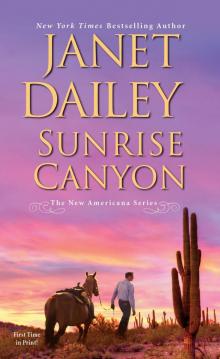 Sunrise Canyon
Sunrise Canyon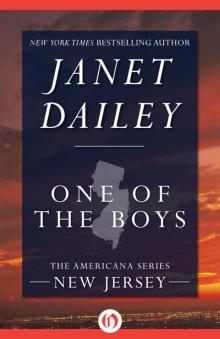 One of the Boys (New Jersey)
One of the Boys (New Jersey)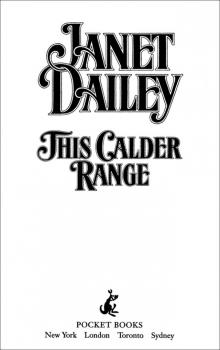 This Calder Range
This Calder Range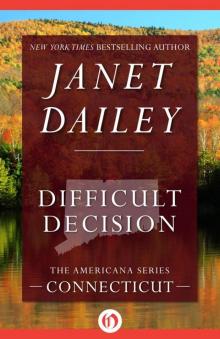 Difficult Decision: Connecticut (The Americana Series Book 7)
Difficult Decision: Connecticut (The Americana Series Book 7)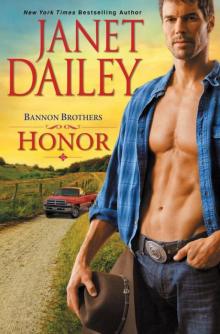 Honor
Honor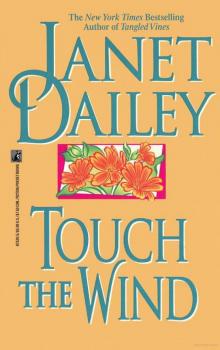 Touch the Wind
Touch the Wind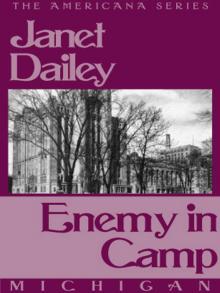 Enemy in Camp
Enemy in Camp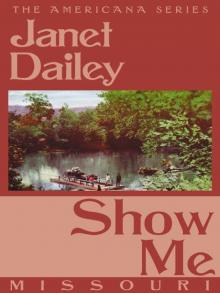 Show Me
Show Me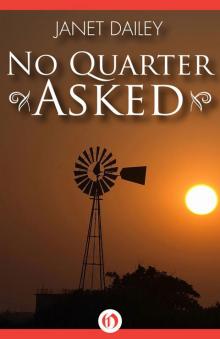 No Quarter Asked
No Quarter Asked The Second Time
The Second Time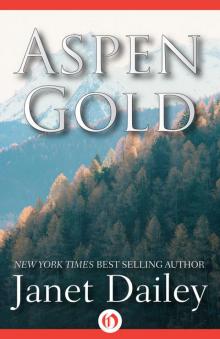 Aspen Gold
Aspen Gold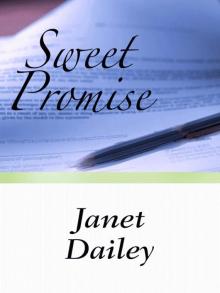 Sweet Promise
Sweet Promise Triumph
Triumph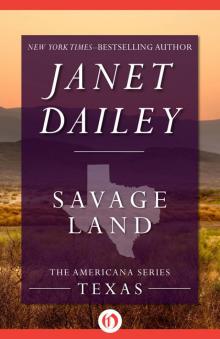 Savage Land
Savage Land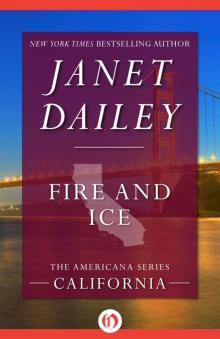 Fire and Ice (The Americana Series Book 5)
Fire and Ice (The Americana Series Book 5)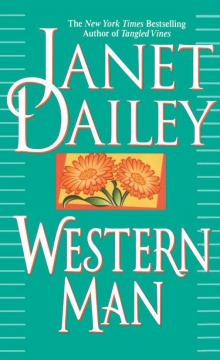 Western Man
Western Man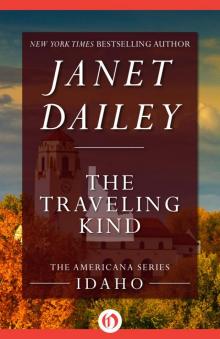 The Traveling Kind
The Traveling Kind The Hostage Bride
The Hostage Bride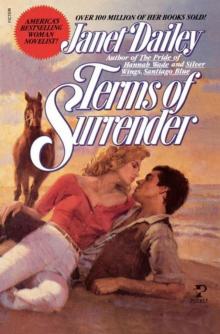 Terms of Surrender
Terms of Surrender Tidewater Lover
Tidewater Lover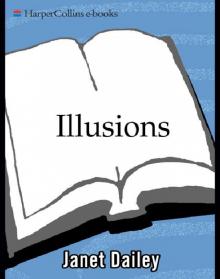 Illusions
Illusions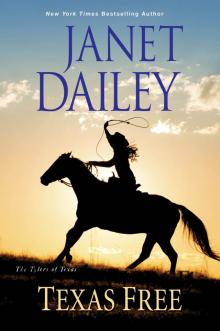 Texas Free
Texas Free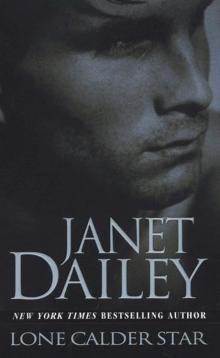 Lone Calder Star (Calder Saga Book 9)
Lone Calder Star (Calder Saga Book 9)